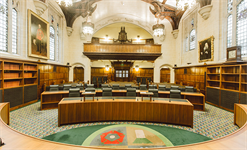One of the UK’s largest charities has today won a Supreme Court case that experts believe could be of benefit to the entire voluntary sector.
Nuffield Health, which made almost £1bn in 2021 and employs 16,400 people, claimed victory over Merton Council – for the third time during a seven-year legal battle.
Judges ruled unanimously that Nuffield can legally claim mandatory relief from non-domestic rates for its members-only gym at Merton Abbey, London.
Merton Council had withheld relief on the basis that the gym was not used “for the public benefit” because its fees were unaffordable for people on lower incomes.
Judges previously ruled in Nuffield’s favour at both the High Court and the Appeal Court.
Today, Supreme Court judges agreed with their peers, saying in a press summary: “The Supreme Court unanimously dismisses the council’s appeal. It holds that Nuffield Health uses the Merton Abbey gym for its charitable purposes.
“Nuffield Health is therefore entitled to the mandatory 80 per cent relief from business rates with effect from 1 August 2016.”
They added that Nuffield had satisfied both of the conditions necessary to qualify for relief: that it is a charity and that the premises are used for the direct fulfilment of its charitable purposes, of promoting health through exercise.
They said: “Nuffield Health is a registered charity and therefore meets the first condition.
“Even though the services provided at the Merton Abbey gym do not, taken by themselves, satisfy the public benefit test in section 4 of the 2011 Act, Nuffield Health’s purposes are exclusively charitable in all the places where they are carried on and, viewed as a whole, satisfy the public benefit test in that section.
“The second condition is also met because Nuffield Health uses the Merton Abbey gym for the direct fulfilment of its charitable purpose of promoting health through exercise. Both the rich and the poor form part of the section of the public served by this purpose.”
Philip Reed, partner in the charity law team at Withers LLP, said: “The public benefit test does not need to be assessed separately at each site. This judgement will give the sector some comfort; charities do not need to rush to check what public benefit is delivered at each of their sites – at least from a rates perspective.”
Reed added a warning: “The Labour Party is currently looking hard at the level of public benefit delivered by fee-charging charities.
“That is specifically aimed at independent schools, but it’s conceivable that a Labour government (if elected) would look at the issues more broadly, and perhaps seek to revise the current statutory framework.
“For charities like Nuffield Health, this could have implications far beyond eligibility for business rates relief.”
